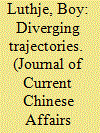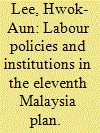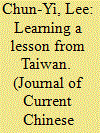|
|
|
Sort Order |
|
|
|
Items / Page
|
|
|
|
|
|
|
| Srl | Item |
| 1 |
ID:
127627


|
|
|
|
|
| Publication |
2013.
|
| Summary/Abstract |
This paper develops a new approach to analyse labour relations at the level of companies, industries, and regions in China. Referring to Western and Chinese labour sociology and industrial relations theory, the author applies the concept of "regimes of production" to the context of China's emerging capitalism. This article focuses on China's modern core manufacturing industries (i.e. steel, chemical, auto, electronics, and textile and garment); it explores regimes of production in major corporations and new forms of labour-management cooperation, the growing inequality and fragmentation of labour policies within the modern sectors of the Chinese economy, consequences for further reform regarding labour standards, collective bargaining, and workers' participation
|
|
|
|
|
|
|
|
|
|
|
|
|
|
|
|
| 2 |
ID:
156969


|
|
|
|
|
| Summary/Abstract |
This paper examines the progress and shortfalls in Malaysia’s labour markets and institutions, and the policies proposed in the Eleventh Malaysia Plan (11MP). While the economy has steadily grown, labour market institutions and policies distinctly lag behind the standards, productivity levels and regulatory efficacy of advanced economies. Commitments to promote productivity and wage growth, boost employment especially for women and young workers, enhance labour market information and improve foreign labour management are welcome. Nonetheless, the 11MP insufficiently confronts labour market structures that perpetuate insecure, indirect and transient employment and overwork, impeding overall productivity gains and prolonging dependency on low-skilled migrant labour. Higher goals and deeper shifts are needed not only to increase productivity and wages per hour as the driving purpose, but also to institute laws and policies overseeing fairness, equality, discrimination, worker representation, social protection and gainful part-time employment.
|
|
|
|
|
|
|
|
|
|
|
|
|
|
|
|
| 3 |
ID:
134306


|
|
|
|
|
| Summary/Abstract |
This paper argues that the comparison of labour policies in Taiwan and China has an important bearing on the interaction between state and society. The fact that labour policies have changed over time illustrates a process of bargaining between the state and society. The core question of this paper is whether the development of labour policies in Taiwan can provide China a good example to learn from. In order to answer this question more systematically, the first part of this paper provides theoretical reviews of the state–society relationship, while the second part aims to verify whether those labour-favouring policies in Taiwan have changed under a different party’s governance. The third part of the paper further investigates labour policy in China; this section mainly focuses on the historical background to the new labour contract law. Based on the preceding two sections’ literature review of the changing path of labour policies, the fourth section scrutinises fundamental issues reflected in the development of Taiwan’s labour policies, then compares how those issues are reflected in the case of China. The conclusion of this paper is that although Taiwan, like China, formerly had a one-party system, the changes in Taiwan’s labour policies are not completely comparable to China, though both societies had some similarities.
|
|
|
|
|
|
|
|
|
|
|
|
|
|
|
|
|
|
|
|
|